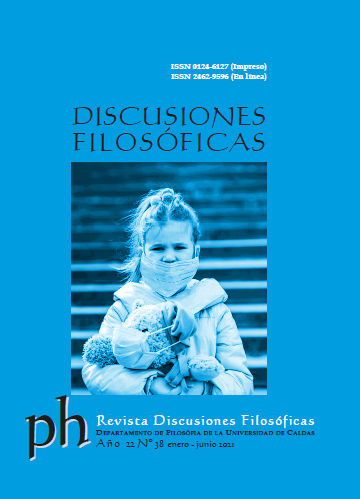Autores
Resumo
This paper attempts to hermeneutically explore and understand Filipino moral ideologies in the time of the COVID-19 pandemic. This study frames its ideology from the conceptual tradition of Karl Marx and other philosophers who shared the common idea that ideology has material existence. As Althusser put it, ideology does not exist in the ‘world of ideas’ conceived as a ‘spiritual world,’ but “ideology exists in institutions and the practices specific to them.” This paper discusses first the concept of moral ideology. The discussion focuses morality as ideology that causes a gap between the rich and the poor. Next, it discusses certain Filipino moral ideologies: Utang na Loob (debt of gratitude), Sakop (group)-oriented and Bahala Na. At the same time, it presents how some politicians and high public officials have taken advantage of these ideologies to promote self-interest. Lastly, the relation between Filipino moral ideologies and politics are manifested in the current situation. As a whole, this paper intends to address the question: “what is wrong with the Filipino system that it seems caught unprepared?”
Referências
Althusser, Louis. On the Reproduction of Capitalism: Ideology and Ideological State Apparatuses. Translated by G.M. Goshgarian, 2014.
Bernardo, Allan. “Exploring Political Values of Filipinos Using an Etic Approach”. Philippine Journal of Psychology. Vol. 50, no. 2, 2017, pp. 7-38. https://www.pap.ph/file/pjp/pjp2017-50-2-pp7-38-bernardoexploring_political_values_of_filipinos_using_an_etic_approach.pdf
Camus, Albert. 1955. The Myth of Sisyphus. Penguin Books.
Curato, Nicole. “The Power and Limits of Populism in the Philippines”. Current History , Vol.117, no. 800, 2018, pp. 209-214. https://doi.org/10.1525/curh.2018.117.800.209
Gripaldo, Rolando. “Bahala Na: a Philosophical Analysis”. Filipino Cultural Traits: Claro R. Ceniza Lectures, 2005, pp.194-211. https://www.researchgate.net/publication/238082707_BAHALA_NA_A_PHILOSOPHICAL_ANALYSIS1
Hollnsteiner, Mary. “Reciprocity in the Lowland Philippines.” Philippine Studies, Vol. 9, no. 3, 1961, pp. 387-413. http://www.jstor.org/stable/42720500
Jocano, F. Landa. Filipino Value System: a Cultural Definition. Philippines, Punlad Research House, 1997.
Kaufmann, Walter. Existentialism: From Dostoevsky to Sartre. Meridian Books, 1960.
Kenny, Anthony. A New History of Philosophy: Ancient Philosophy. Clarendon Press, 2004.
Mulder, Niels. “Filipino Identity: The Haunting Question.” Journal of Current Southeast Asian Affairs, Vol.32, no.1, pp. 2013, pp.55-80.5. https://doi.org/10.1177/186810341303200103
Mercado, Leonardo. Applied Filipino Philosophy. Divine Word University Publication, 1977.
Miralao, Virginia. “The Family, Traditional Values and the Sociocultural Transformation of Philippine Society”. Philippine Sociological Review, Vol.45, no.1-4,1997, pp.189-215. https://pssc.org.ph/wp-content/pssc-archives/Works/Virginia%20Miralao/The_Family%20Traditional%20Values%20and%20the%20Sociocultural%20Transformation%20of%20Philippine%20Society.pdf
Quimpo, Nathan Gilbert. “The Philippines: Political parties and corruption.” Southeast Asian Affairs, Vol. 2007, 2007, pp.277-294.
Reyes, Jeremiah. «Loób and Kapwa : An Introduction to a Filipino Virtue Ethics». Asian Philosophy, vol. 25, no. 2, 2015, pp. 148-71. https://doi.org/10.1080/09552367.2015.1043173
Reilly, Benjamin. «Electoral Systems and Party Systems in East Asia». Journal of East Asian Studies, vol. 7, no. 2, 2007, pp. 185-202. https://doi.org/10.1017/S1598240800008705
Ward, Leo. Ethics and Social Science. Notre Dame Press, 1959.
Žižek, Slavoj. Pandemic! COVID-19 Shakes the World. OR Books, 2020.
Žižek, Slavoj. Violence: Six Sideways Reflections, Picador.
Žižek, Slavoj. “The Spectre of Ideology.” Mapping Ideology, Verso, 1994.

 PDF (English)
PDF (English)
 FLIP
FLIP
 Perfil Google Scholar
Perfil Google Scholar






















